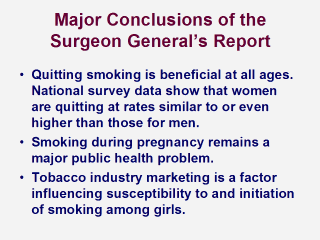 |
Women who
stop smoking greatly reduce their risk of dying prematurely, and quitting
smoking is beneficial at all ages. Although some clinical intervention
studies suggest that women may have more difficulty quitting smoking than
men, national survey data show that women are quitting at rates similar to
or even higher than those for men. Prevention and cessation interventions
are generally of similar effectiveness for women and men and, to date, few
gender differences in factors related to smoking initiation and successful
quitting have been identified. Smoking during
pregnancy remains a major public health problem despite increased knowledge
of the adverse health effects of smoking during pregnancy. Although the
prevalence of smoking during pregnancy has declined steadily in recent
years, substantial numbers of pregnant women continue to smoke, and only
about one-third of women who stop smoking during pregnancy are still
abstinent one year after the delivery. |
